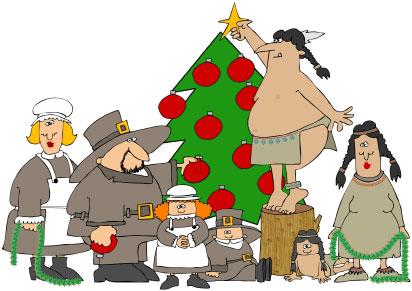
Photo courtesy of iStockphoto
Every December I hear about a “War on Christmas”, which has something to do with the issue of people using the blasphemous phrase, “happy holidays”, rather than the pious and reverent, “merry Christmas”. Since this is being characterized as a war I assume those who worry about the problem, and truly believe it to be a raging battle, are mostly concerned about the potential vanquishing of Christmas in America, under the assault of political correctness. Personally, I am fairly confident that Christmas is not in any danger of being banned, or even of being secularized into oblivion. However, I do recognize that others are genuinely concerned, and that growth in the awareness of the plurality of holiday traditions has raised anxieties about change and encroachment. This is understandable from the point of view of any tradition, and Christmas in America is certainly a most cherished tradition. How things have changed.
Today’s Americans are generally in the know about the Pilgrims and the First Thanksgiving, but they are much less aware of the Strangers and the First Pilgrim Christmas. The second English ship to dock in Plymouth Harbor, carrying supplies for the Pilgrims, along with new settlers bound for the Colony, was the Fortune, arriving at the end of November in 1621. The First Thanksgiving had been about a month or two before, and the Pilgrims had not been expecting a ship, at first fearing it was the French come to eradicate them. Of the sixty-six men and sixteen women who were the new arrivals, a good number of them were Strangers. These Strangers were mostly single men, and they were outsiders who had no connection to the Pilgrim settlers who had arrived before them on the Mayflower. On December 25th, 1621 the Pilgrims found that the Strangers were unwilling to go about the typical work that day, because they insisted that Christmas was a holy day, on which work was to be abstained. Plymouth’s Governor William Bradford and the other Pilgrims did not share this view of Christmas, but let them have the day off anyway.
When Bradford and the Pilgrims returned from work at noon they found the Strangers having a merry time and playing a cricket-type of game, as was their Christmas custom. The angry Governor confiscated the gaming equipment and sent the Strangers to their homes for private celebration in the form of prayer, because, “there should be no gaming or reveling in the streets.” (Philbrick 128) The Pilgrims, like my ancestor Governor John Endecott of Massachusetts Bay Colony, were Puritans, and they did not find any biblical support for a celebrating the birth or death of Jesus, and in their piety they did not commemorate Christmas or even Easter. They recognized that Jesus was not born in the winter, and that Christmas was actually more closely related to the Pagan celebrations of the Winter’s Solstice and Saturnalia, appropriated by the Roman Empire to make conversion easier. Honoring the Sabbath and feasting on Thanksgiving were about the only holidays for the Pilgrims. The Strangers were the more traditional in this situation then, with the Pilgrims being the radical party in their fanatical restrictions on merry making. So, Governor Bradford was the first Grinch to steal Christmas, and it was the Pilgrims who declared the original War on Christmas in America.
The non-observance of Christmas was a tradition that held in some circles of America until at least ratification of the Constitution. In fact, the first United States Congress of 1789 was in session and busy at work on December 25th. Boston went so far as to officially ban Christmas from 1659 until 1681, and the birth of Jesus did not become a national holiday in the United States until 1870 (“An Outlaw Christmas”). This was later on in our history than when Thanksgiving received the same honors, under President Lincoln. If you are worried about a contemporary War on Christmas then it follows logically that you should be sympathetic to the plight of the Strangers under the Pilgrim theocracy, and that you would condemn the First U.S. Congress for their impious secular habit of working on December 25th. But then this seems a bit silly, doesn’t it? Recognizing this, one can see that America has come a long way in its tolerance of the celebration of Christmas since our founding, and this does not appear to be a losing battle. I myself look forward to celebrating Christmas every year with family, and I am not the least bit worried that my freedom to do this is in any jeopardy. So in the wise words of John Lennon I shout, “Merry Christmas! The War is over!”
Jared Roy Endicott



posted on 24 December at 22:13
Merry Christmas, Jared. May 'Peace' happen soon.